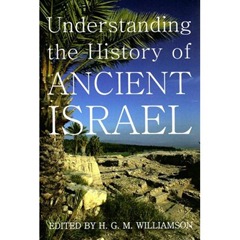You might want to put down your coffee before you read how David Ussishkin classifies himself in relation to other archaeologists. This description is from his chapter in Understanding the History of Ancient Israel. He writes:
“The biblical archaeologists of our time can in fact be divided into three groups according to their approach to the use of the biblical text.
“The first group includes the fundamentalists, who believe in the reliability of the biblical text in all its details, and that the text forms the basis and guide for their archaeological work. I can mention, for example, Bryant Wood and his work on Jericho (e.g. Wood 1990), and Adam Zertal, who restored an imaginary altar on Mount Ebal on the basis of the biblical text (e.g. Zertal 1986–87). Both of them, as well as other scholars of this group, are good, professional archaeologists, but their archaeological work is clearly biased and distorted by their views on the biblical text.
“The second group should be termed the ‘Followers of Albright’. This group includes the majority of biblical archaeologists practising today. Prominent among them are the American scholars who have been introduced to archaeology through theology and biblical studies. I can mention people like Albright himself, Ernest Wright or William Dever. The ‘Followers of Albright’ also dominate biblical archaeology in Israel. Yigael Yadin, who was a follower of Albright, was the leader of this school of thought in Israel, and its present centre is Jerusalem. Significantly, neither Yadin nor the majority of Israeli biblical archaeologists are religious, hence their adherence to this school of thought does not stem from religious beliefs.
“The basic concept of the ‘Followers of Albright’ is the acceptance of the framework of biblical history as the basis for their archaeological studies. They take the archaeological data and fix them into this framework in exactly the same way that children assemble a jigsaw puzzle: also in this game one follows a known general framework, and then whenever an additional piece is identified, one puts it into its proper position in the framework.
“The third group includes a small number of scholars, whom I labelled ‘the Followers of Hercule Poirot’ for lack of a better term, and at present their centre is at Tel Aviv. I shall mention here Aharon Kempinski, Ze’ev Herzog, Israel Finkelstein and myself, and there are several others. These scholars believe that in recent years the discipline of biblical archaeology has developed tremendously and reached maturity, that huge amounts of significant data have accumulated, and also new research techniques and methods have been adopted and applied. As a result, biblical archaeology has slowly become an independent discipline, and archaeological research can now be conducted in an objective manner without leaning on the biblical text.”
Source: David Ussishkin. “Archaeology of the Biblical Period: On Some Questions of Methodology and Chronology of the Iron Age.” In Understanding the History of Ancient Israel, ed. H. G. M. Williamson, 131–41. Proceedings of the British Academy, vol. 143. Oxford: Oxford University Press for The British Academy, 2007. (Amazon, Worldcat)
Comment: If only those backward fundamentalists would come around to realizing that biblical archaeology has reached maturity, that huge amounts of significant data have accumulated, that new research methods have been adopted, and that objective archaeology doesn’t lean on the biblical text.
Ussishkin’s dating of the Jezreel compound to the time of Ahab is a parade example of leaning (falling? laying prostrate?) on the biblical text. I think he’s right to do it, but it does call into question his categories.